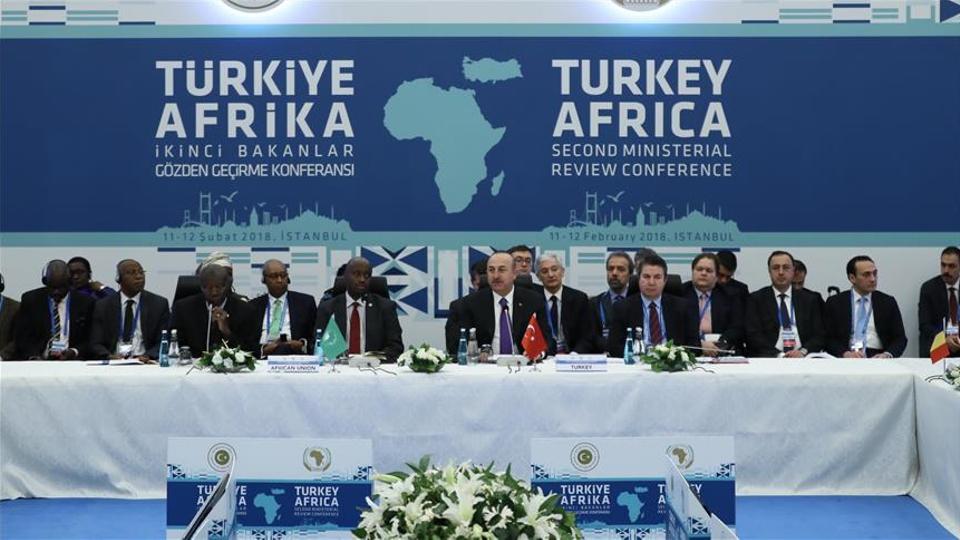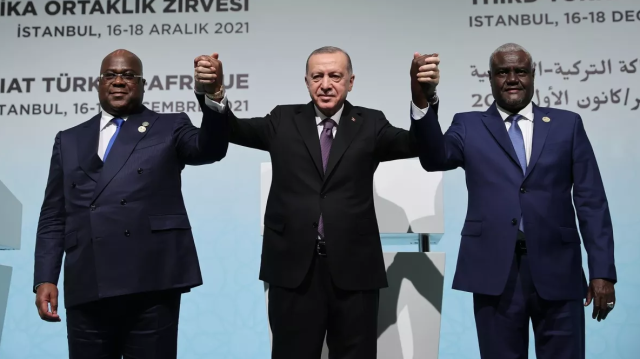
Turkey’s policy on Africa is based on many different soft power elements such as trade relations, humanitarian aid, flight diplomacy, media, cultural diplomacy, education

At the time of the establishment of the Republic of Turkey, the majority of African countries were under colonial rule. During this period, the newly established republic had domestic priorities such as economic development and nation-state building.
It is necessary to evaluate the current stagnation in relations in the following years within the framework of the dynamics of the Cold War period, Turkey’s security concerns, and allied relations. During the same period, there were also some attempts at rapprochement with African countries, but they were short-lived.
Turkey’s efforts to improve its relations with African countries at the end of the 1960s, 1970s, and even 1990s coincide with periods when it felt lonely internationally and sought support for foreign policy moves and alternative partners. The policy of decolonization of Africa, adopted in 1998, is the most comprehensive among the initiatives undertaken up to that time. However, this policy has not been fully implemented due to some political and economic problems.
Turkey’s relations with African countries have gained momentum, especially after the declaration of 2005 as the “Year of Africa” and the First Turkey-Africa Cooperation Summit held in 2008. The vast majority of the 43 embassies were opened in the years after this peak. Between 2009 and 2014, Turkey opened embassies in 27 African countries.
Turkey’s policy on Africa during this period has some features that separate it from previous periods. The first is that business circles and non-governmental organizations largely coordinate with public organizations in the implementation of African policy and act as a complement to the African opening. Second, and perhaps more prominent feature is that Turkey’s Africa policy is based on many different soft power elements such as trade relations, humanitarian aid, flight diplomacy, media diplomacy, cultural diplomacy, education, and religious diplomacy.
Trade and cultural relations
In 2021, Turkey’s trade volume with African countries was at the level of $25 billion, and commercial relations had the potential to reach a higher level. Turkish companies operating on the continent since the 1970s have signed major projects, especially in the field of infrastructure. Yunus Emre Institute (YEE), the main institution conducting cultural diplomacy activities of Turkey, has 10 cultural centers in eight African countries, and this number is planned to be doubled in 2022.
While interest in Turkish culture and language is increasing through the cultural centers opened on the continent, these centers also contribute to the deepening of the interaction between cultures.
Another development, which is important in terms of public diplomacy, that enhances intercultural communication between African countries and Turkey has been extending scholarships to students, under the name of Turkey Scholarships after the establishment of the Presidency of Turks and Related Communities Abroad (YTB) in 2010.
With the introduction of the Turkey Scholarships in 2012, the number of African students studying at higher education institutions in Turkey increased by more than four times. The vast majority of these students come from North African countries with which Turkey has intensive relations, such as Somalia, Sudan, and Ethiopia.
However, a significant number of students from even relatively smaller African countries in terms of population and geography, such as Djibouti, Benin, and Guinea, study at Turkish universities. Scholarships provided to African students should be considered an important source of investment in terms of the future of Turkey’s relations with African countries. Because the individuals who benefit from these scholarship programs and return to their countries with a positive opinion about Turkey play an important role in the relations between Turkey and their own countries.
Another institution engaged in educational diplomacy activities is the Maarif Foundation of Turkey. In the short time since its foundation in 2016, the Maarif Foundation has provided education to more than 17,000 African students through 175 educational institutions in 25 African countries. The foundation contributes to the soft power of Turkey with the Turkish-speaking students.
Scholarships to students
In addition to these organizations, the Turkish Religious Foundation (TDV) also provides scholarships at the university and high school level to Muslim students from various African countries. The TDV also builds mosques in many African countries, repairs damaged mosques, and organizes relief campaigns for the needy in African countries, especially during religious months.
Meanwhile, Turkey’s international aid organization, the Turkish Cooperation and Coordination Agency (TIKA), provides official development assistance to African countries. TIKA with the Turkish civil society organizations and other public institutions initiates projects in many fields, mainly in education, health, and agriculture, and conducts training programs to address the need for skilled labor in sectors and professions needed in African countries.
Anadolu Agency, another organization that contributes to Turkey’s soft power potential, has also opened publishing centers or offices in several African countries. In addition to Anadolu Agency, the TRT World channel, which started broadcasting in 2015, has been reaching almost all over Africa in English thanks to both internet broadcasting and traditional television broadcasting. One of the most important developments in this field has been the launch of TRT Swahili’s broadcasting service in 2020.
As of 2022, Turkish Airlines flies to 61 destinations in 40 countries on the African continent. Turkish Airlines, which launched flights to 12 destinations on the continent in 2012 alone, is expanding its flight networks, acting according to the priorities of Turkish foreign policy and helping to increase Turkey’s visibility in Africa.
Military cooperation
Meanwhile, issues of military cooperation with African countries didn’t draw great attention until the opening of the TURKSOMOL military training facility in the Somali capital Mogadishu in 2017 to train Somali soldiers and the signing of a military and security cooperation agreement with the Military Memorandum of Understanding Government based in the Libyan capital Tripoli in 2019
Recently, the main reason why Turkey’s military presence in Africa has become more discussed has been the increasing export of weapons, armored ground vehicles, and especially Unmanned Aerial Vehicles (UAVs) / Armed Unmanned Aerial Vehicles (SIHA) to African countries in parallel with the development of the defense industry.
Turkish-made UAVs are in great demand from African countries, both because they are cheaper than their alternatives in the market, and because Turkey does not link the sale of these weapons to political conditions and positions. In this regard, Turkey has emerged as an important alternative to Russia, France, the US, and China, which have held the arms market on the continent for many years in the eyes of African countries.
Turkey’s defense industry’s exports to African countries will likely increase even more in the coming years. But there is also a possibility that sales to African countries that have various problems with their neighbors or are the scene of internal conflicts will damage relations with other African countries.
Challenges and risk
Therefore, in the process of integrating elements of hard power into the elements of soft power that have been the backbone of Ankara’s Africa policy for many years, careful action should be taken, especially regarding the sale of weapons, and intra-regional dynamics should be taken into account.
Otherwise, there is a risk that this issue will damage the image of Turkey and its soft power projection, in which significant investments have been made for many years.
However, other challenges arising from international competition in the continent also await Turkey in the medium and long term. To combat these challenges, the use of soft power and hard power elements together will be decisive in Turkey-Africa relations.
By Elem Eyrica Tepeciklioglu
– The writer is a faculty member of Turkey’s Yasar University in western Izmir province.
